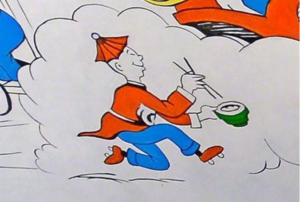“Any clod can have the facts; having opinions is an art.” – Charles McCabe
What I Believe
A compilation – in no particular order – of some of my longstanding theories and many of my current ideas and opinions…
* Conventional thinking is not thinking.
* Social Science, as practiced today, is an oxymoron. It would be much better to call it Social Dogma.
* Economics is a valid field of knowledge, one that sometimes employs the scientific method, but it is not a science.
* Most of economic and investment theory is based on incomplete data and faulty premises.
* The currently popular academic philosophies of intersectionality and structuralism are intellectually dishonest and pragmatically destructive.
* Charity is dangerous to both the giver and the receiver. It creates a false sense of accomplishment in the one, and dependency and entitlement in the other.
* Of the many kinds of charitable actions, giving away things (including one’s time, one’s wisdom, one’s knowledge, one’s things, and one’s money) is the worst kind.
* Businesses that put their employees or shareholders ahead of their customers are morally bankrupt and will eventually be financially bankrupt.
* The currently popular theories of institutional racism, inherent bias, white privilege, and reparations are intellectually dishonest and harmful to people of color.
* Police violence is not the number one issue facing African-Americans today. It is not even on the top 10 list.
* Social workers are not necessarily saints. Nor is social work necessarily saintly. But social workers can be good and social work can be helpful if it is done carefully.
* The four-hour work week was once a dream. Now it’s becoming a possible nightmare.
* Of all the professions that contribute to the wealth of nations, entrepreneurs and small business owners provide the greatest good for the greatest number of people.
* The primary job of government is to establish law and order so that its citizens can be free to go about their business.
* Governments are not structured to create wealth and they do not. What they do is redeploy wealth towards political and military objectives.
* Politicians, government workers, and military personnel take part in the business of redistributing wealth. It is always in their interest to do so.
* Zen thinking is the equivalent of sub-atomic theory.
* Culture – including micro-culture – is the single most important factor in social and financial advancement.
* The most important component of a success culture is the belief in hard work, continuous education, and saving.
* Slavery was and is a commercial activity whose objective was to create profits for slaveholders. But the system of slavery was never profitable as a whole.
* All businesses pass through at least 4 distinct levels of growth, each with distinct challenges and opportunities. Any founder or CEO that doesn’t know them is doomed to failure.
* Capitalism is not an intellectual ideology like Socialism and Communism, but the most natural and fairest form of human commerce.
* Every young person entering the workforce comes to the job with immutable tendencies, prejudices, psychological preferences, and habits that are nearly impossible to change.
* Business management efforts to motivate employees are completely ass-backward.
* 90% of psychological counseling and marriage counseling doesn’t work – for good reason.
* Much of mainstream medicine is scientifically dishonest and harmful and expensive to patients.
* Serial killers are 98% like the rest of us.
* Liberals are less generous with their personal charity than Conservatives.
* The mainstream media can’t be trusted.
* Any economic philosophy that does not account for the work of the Austrian economists (Hazlitt and Hayek) is sure to develop ideas that are so profoundly idiotic that they are not worth a moment’s attention.
* Being thoughtful is more useful than being intelligent.
* Adherence to any political party is always and necessarily intellectually bankrupt.
* Political partisans are not to be trusted.
* Men and women are fundamentally different but not always in ways people commonly think.
* All wars, regardless of cause or justification, are destructive.
* Of the many wars the US has been involved in over the last hundred years, the most costly of them, in terms of dollars and lives, were the war on drugs and the war on poverty.
* The new wars will be against institutional racism and social injustice. They, too, will be extremely costly in terms of dollars and lives, and they, too, will fail.
* The search for freedom is a more important humanitarian objective than the search for equality.
* Equality of opportunity is a legitimate goal of a just society. Equality of outcome is a recipe for injustice.
* Nature itself abhors equality. Everything within and without the human animal strives constantly and continuously towards the unequal.
* Every social and political effort in history that has made equal outcomes a goal has failed.
* You don’t need an education in art and music to become an expert at it.
* 90% of what Americans spend their money on is based on wants, not needs.
* Trying to “be number one” is a childish and self-destructive goal, whether employed by an individual, a group of individuals, or a country.
* Working-class and poor people fight and die in wars that do them no good but profit the elites that send them to war.
* Soldiers fight for ideals and ideas that are sold to them by people that don’t believe them.
* We are all morally obliged to take responsibility for and fix our problems, even if they are caused by someone or something else.
* Happiness is only marginally related to wealth.
* By understanding the relationship between money and happiness, we can make better decisions about how we make money, how much money we need to make, and how we can enjoy the money we make.
* Income is an important factor in the acquisition of wealth, but it is not a measure of it.
* Most people want to have a higher income and net worth, and many people work hard and long to increase their wealth. But few achieve the financial goals – conscious or unconscious – that they set for themselves. There are reason for that, which the wealth seeker should understand.
* Sharing wealth is more rewarding than growing it.
* Getting up early really is superior to getting up late.
* Organizational growth in any form – business, non-profits, social programs, etc. – is created by a very tiny fraction of the community involved.
* Growth creators are entitled to the lion’s share of the wealth, prestige, or acclaim that comes from that growth.
* It is not possible to motivate 80% of a workforce to work harder unless you ignore them and demand that the 20%, who are already working overtime and on weekends, work more.
* The military-industrial complex is real.
* The medical-industrial complex is real.
* As much as 30% of what are considered established and proven medical practices, including surgeries and medication, have no scientific support.
* Over the last 20 years, there has been a huge transfer of wealth from the working class to Wall Street.
* In bad economies, the debt created by the government/corporation cabal is paid for not by either of them but by entrepreneurs and the working class.
* Racism, ageism, sexism, classism, and elitism exist in most cultures and can retard and, in some cases, restrict individual economic advancement. But the negative effects are rarely absolute. Extraordinary individuals can and do overcome them.
* Wealth and income inequality are realities that exist in every economy – even those committed in principle to the distribution of wealth.
* Two words normally used interchangeably – saving and investing – should not be considered synonymous. The primary concern of saving is safety. The primary concern of investing is growth.
* Wall Street promotes the idea that investing in stocks and bonds is the sensible way to grow rich. But any strategy that focuses solely or even primarily on stocks and bonds is flawed.
* Every asset class and financial strategy has its own inherent characteristics, investment advantages and disadvantages, profit and growth potentialities, and risk profiles. The smart investor understands this and balances his portfolio accordingly.
* There are proven ways to safely achieve a higher-than-average ROI for certain asset classes under certain conditions. One can, for example, safely double the ROIs on income-producing real estate by using bank financing wisely. The same is true for many business transactions, some stock strategies, and a handful of other asset classes.
* The financial industry promotes the idea that life insurance is something every sensible person should have. In fact, life insurance makes sense only in certain circumstances.
* Most people fear entrepreneurship because they believe it takes genius, courage, and luck. In fact, these factors are rare contributors to success in start-up business ventures. The factors that matter most are common sense. humility, cautiousness, a relentless work ethic, and perseverance.
* With respect to building wealth, there are two kinds of skills: financially valued skills and financially valuable skills. Developing skills in either category is a big advantage in building wealth – but the financially valuable skills are more important.
* The purported benefits of great wealth – financial security, choices, and prestige – are more valued in their absence than when they are present.

 MarkFord
MarkFord


